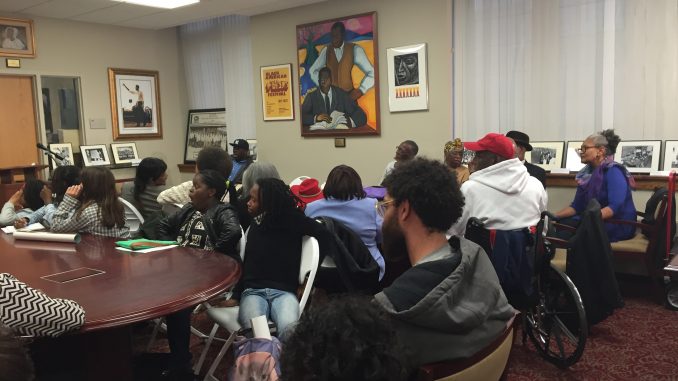
Paintings and photographs depicting African American history hung on the walls surrounding those who were gathered to remember Melvin “Mel” Dorn Shamlin, a civil rights activist and the founder of the Cecil B. Moore Freedom Fighters.
The crowd of about 50 people gathered at Temple’s Charles L. Blockson Afro-American Collection in Sullivan Hall to share kind words and memories about Shamlin, who is well-known for his involvement in the protests to desegregate Girard College in the 1960s.
Many who spoke at the memorial shared similar stories about Shamlin’s humor, no-nonsense attitude and passion for justice. Shamlin died a year ago, but the memorial was held off until now so that all who wanted to attend could do so.
Among those in attendance were family and friends, some of whom were Freedom Fighters, as well as fifth and sixth grade students from the Jubilee School in Philadelphia.
Karen Falcon, founder of the Jubilee School, met Shamlin eight years ago when he and the rest of the Freedom Fighters came to visit and speak with her students at the time. They were studying the Civil Rights Movement.
From then on, Shamlin made visits throughout the years to see the students at the Jubilee School.
At the memorial, current Jubilee School students read two poems written in memory of Shamlin, as well as old letters written by the former students whom Shamlin spoke with eight years earlier.
One letter, originally written by a little girl named Lashe, reads: “Dr. Martin Luther King was a good man, and so are you.”
Shamlin served as King’s driver when he visited Philadelphia to speak about the desegregation of Girard College.
Falcon said it was important to bring her current students to Shamlin’s memorial because they need to learn about the past to navigate their future.
“We teach a lot of the history that’s not taught in the history books,” Falcon said. “We know that they can learn so much from interviewing people from the community about the important things that have happened and the people who have fought for justice to make their lives better.”
Blockson Collection Curator Dr. Diane Turner said she first met Shamlin when she was conducting oral history interviews as part of research project on the protests calling for desegregation of Girard College.
Shamlin was one of her first interviewees.
“One of the things that Mel told me which I really didn’t know … [is] when you look at some of the images that were taken up at Girard College, often times it’s very prominent men and leaders and so forth,” Turner said. “And he informed me that it was predominantly women up there most of the time.”
Shamlin’s interview has been preserved in the Blockson Collection archives, and the memorial was also recorded for preservation.
Kenneth Salaam, a fellow freedom fighter and childhood friend of Shamlin, spoke at the memorial. He said Shamlin was at the wall, which enclosed Girard College, on the first day of the protests.
“May 1, 1965 – he went there and never left,” Salaam said.
Salaam described his close friend as the “conscience of North Philadelphia,” and talked about many of their efforts together during the Civil Rights Movement.
Salaam recounted how he and Shamlin handcuffed themselves to the front doors of the post office on 30th Street to protest its ban of African Americans from serving as supervisor as well as the time he and Shamlin confronted members of the Ku Klux Klan at one of the group’s rallies near Lincoln University.
Jerome Dorn, Shamlin’s brother, also spoke at the memorial. He said that he had the unique perspective of knowing his brother as both an activist and a family member.
As a brother, Dorn said Shamlin was “always there to encourage and support [him].” And as an activist he described his brother as a no-nonsense “fighter” for equality.
“He’s still fighting the struggle for us in spirit,” Dorn said.
Jenny Roberts can be reached at jennifer.roberts@temple.edu or on Twitter @jennyroberts511.


Be the first to comment